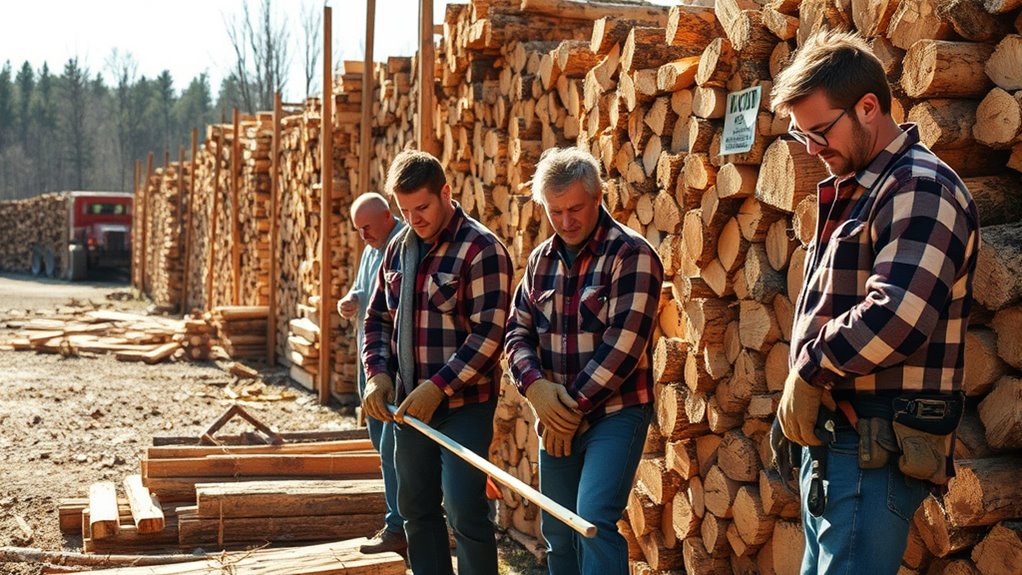As a seasonal firewood worker, your rights include proper job classification, fair wages, and safe working conditions under labor laws. You’re protected for injuries, can take mandated breaks, and should use safety gear to prevent accidents. You also have the right to organize, access labor support, and report violations without retaliation. Understanding these laws guarantees you’re treated fairly — keep going to find out more about your protections and responsibilities.
Key Takeaways
- Proper classification of workers affects rights, benefits, and legal protections under labor laws.
- Laws ensure fair wages, overtime pay, and protection against wage theft for firewood workers.
- Regulations mandate rest breaks, maximum working hours, and safety standards to prevent overwork and injuries.
- Workers are protected from retaliation and have rights to organize, unionize, and access legal resources.
- Injury reporting, workers’ compensation eligibility, and safety equipment requirements safeguard workers’ health and legal rights.
Employment Classification and Temporary Work Status

Understanding how your employment is classified is essential because it determines your rights and protections as a seasonal firewood worker. Classification issues often arise when employers label workers as independent contractors or temporary employees, which can impact your eligibility for benefits and legal protections. If you’re considered temporary employment, it means your job is limited to a specific period or project, and your rights may differ from full-time employees. Proper classification guarantees you receive the appropriate wages, safety measures, and legal protections. Misclassification can lead to lost benefits and legal issues for both you and your employer. Recognizing your employment status helps you understand what rights you have and prevents potential exploitation related to classification issues and temporary employment. Additionally, understanding employee classification is crucial to ensure compliance with labor laws and to protect your employment rights.
Minimum Wage and Overtime Regulations
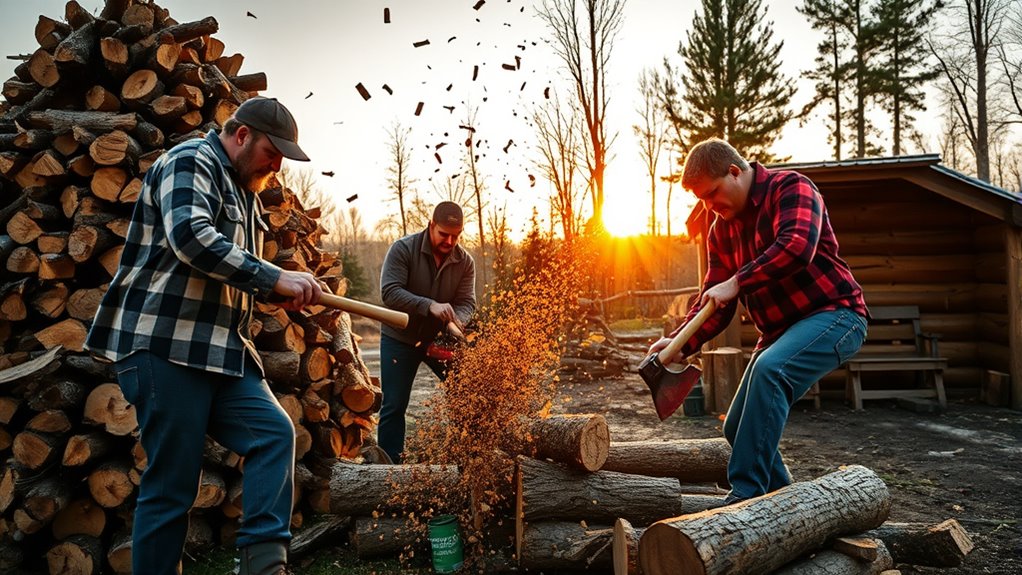
Are you aware of how minimum wage and overtime laws protect you as a seasonal firewood worker? These laws guarantee you’re paid fairly for your work, preventing wage theft. Your employment contract should clearly state your wage rate and overtime pay, so you know your entitlements. If you’re asked to work more than 40 hours a week, you’re generally entitled to overtime pay at 1.5 times your regular rate. Employers can’t legally withhold wages or manipulate your pay to avoid these rules. Knowing your rights helps you stand up against unfair practices and ensures you receive the compensation you deserve. Always review your employment contract carefully and report any violations to the appropriate labor authorities. Your fair pay depends on understanding and enforcing these minimum wage and overtime regulations. Understanding employment laws can empower you to better navigate your rights and protections in the workplace.
Working Hours and Rest Break Requirements
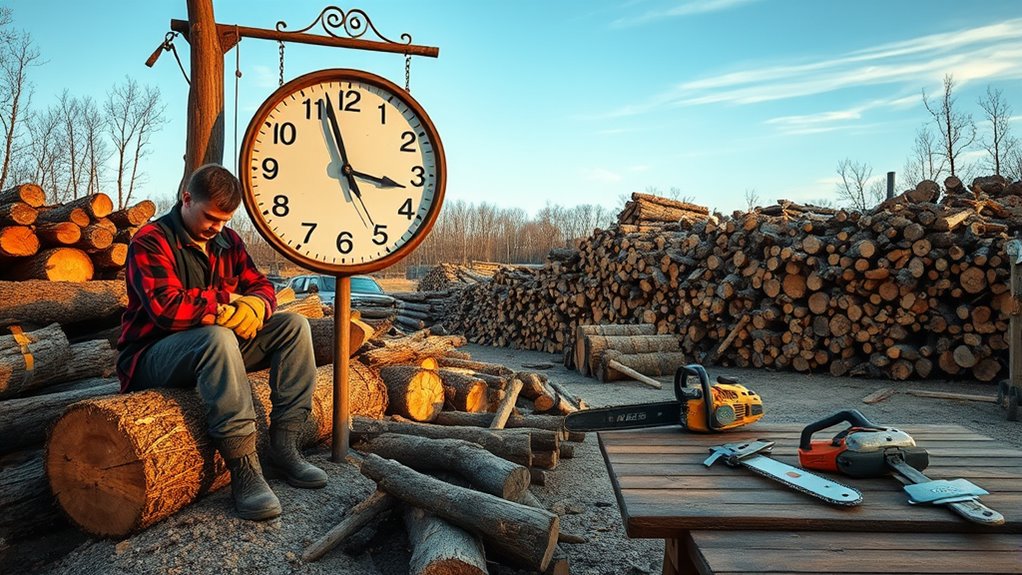
Knowing your rights around wages and overtime is important, but it’s equally essential to understand the rules about working hours and rest breaks. Rest period policies guarantee you get adequate breaks during your shift, helping you stay safe and alert. Shift scheduling regulations specify maximum daily and weekly hours, preventing overwork and fatigue. As a seasonal firewood worker, your employer must adhere to these regulations, which often include a mandated rest period after a certain number of hours worked. Breaks are typically paid or unpaid, depending on local laws. Be aware of your rights to scheduled rest and proper shift planning. Understanding these rules helps you maintain a healthy work-life balance and ensures fair treatment throughout your employment. Participating in remote hackathons can also help you develop skills and knowledge that support your understanding of labor regulations and workplace rights.
Health and Safety Standards for Firewood Workers
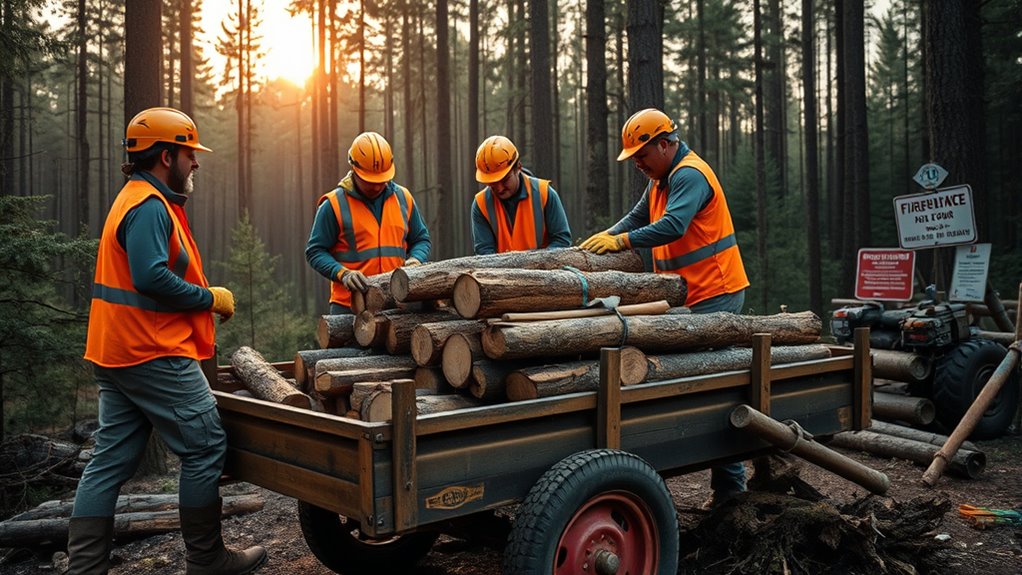
Your safety on the job depends on following clear health standards. You need to wear the proper protective gear, handle hazardous materials carefully, and maintain a safe work environment. Let’s look at what these requirements mean for you. Being aware of proper toilet maintenance practices can help prevent accidents and ensure a safer work setting.
Protective Gear Requirements
To guarantee safety while working with firewood, wearing the appropriate protective gear is essential. You should always wear protective clothing that covers your arms and legs to prevent cuts, splinters, and abrasions. Durable, long-sleeved shirts, heavy-duty pants, and gloves are necessary to shield your skin from sharp tools and rough surfaces. Safety helmets are critical to protect your head from falling branches or logs. Make sure your helmet fits snugly and is equipped with a chin strap to stay secure during work. Additionally, using sturdy boots with slip-resistant soles helps prevent falls and injuries. Prioritizing the correct protective gear reduces the risk of accidents, ensuring that you stay safe while handling firewood. Incorporating personal protective equipment into your safety routine further enhances your protection on the job.
Hazardous Material Handling
Handling hazardous materials properly is essential to maintaining safety on the firewood worksite. You must follow strict procedures for hazardous material handling to prevent accidents. First, ensure all chemicals, like preservatives or cleaning agents, are stored separately from firewood and labeled clearly. Second, when handling hazardous materials, wear appropriate protective gear to avoid exposure. Third, regularly inspect firewood storage areas to check for leaks or spills, and clean them immediately. Proper firewood storage also minimizes risks by keeping combustible materials organized and away from ignition sources. Additionally, understanding the properties of hazardous substances helps in managing risks more effectively. Remember, neglecting hazardous material handling can lead to injuries or environmental hazards. Always adhere to safety guidelines, and never mix hazardous substances with firewood or store them improperly. Your vigilance keeps everyone safe.
Work Environment Standards
Are firewood workers aware of the strict health and safety standards that protect their well-being? These standards emphasize proper firewood storage to prevent accidents and injuries. You should store firewood in stable, well-organized stacks, away from walkways and work areas. An outdoor shelter is essential to shield you from harsh weather conditions, reducing the risk of slips, trips, and falls. Make sure the shelter has good ventilation to avoid harmful dust buildup. Adequate lighting in your workspace helps you see hazards clearly. Employers must provide protective gear like gloves, goggles, and masks, especially when handling wood or working near outdoor shelters. Incorporating air quality considerations into your work environment can further reduce health risks associated with dust and airborne particles. Following these work environment standards keeps you safe, healthy, and prepared for the physical demands of firewood harvesting.
Workers’ Compensation and Injury Protections
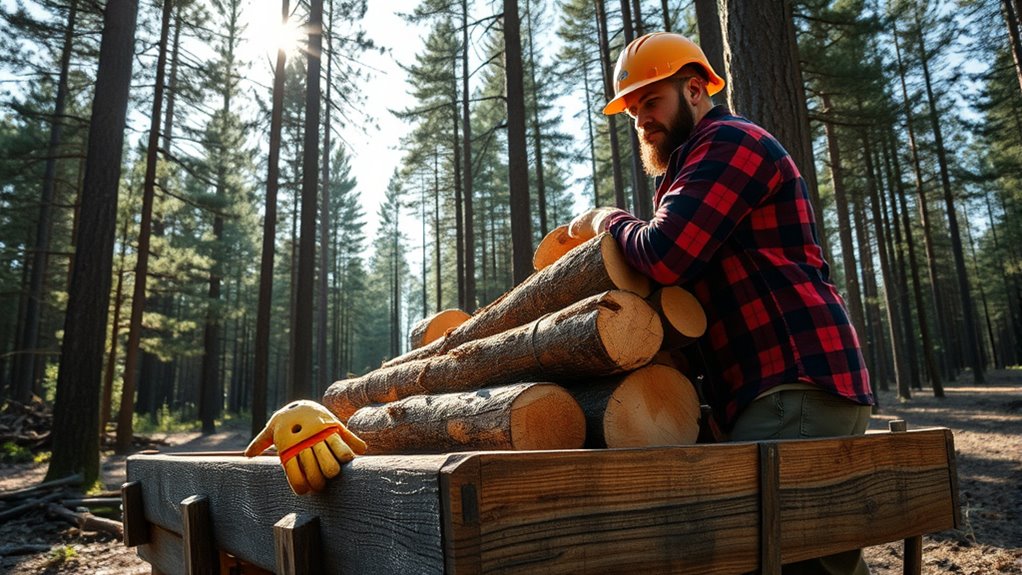
When you’re injured on the job, knowing how to report it quickly is vital. You also need to understand your eligibility for workers’ compensation and what safety equipment you should have. Let’s explore these protections to guarantee you’re covered and safe while working. Being aware of signs of spoilage can help you judge the safety of consumables related to your work environment.
Injury Reporting Procedures
Have you ever wondered what steps to take if you get injured while working in the firewood industry? First, prioritize safety by following your company’s emergency procedures immediately. Next, ensure injury documentation is complete by noting the date, time, location, and details of the incident. Finally, report the injury promptly to your supervisor to initiate the proper process. Remember, timely reporting helps protect your rights and guarantees you receive necessary medical attention. Here’s what to do:
- Follow emergency procedures to secure safety.
- Document the injury clearly with accurate details.
- Report the injury to your supervisor without delay.
- Be aware of Workers’ Compensation regulations that can support your recovery and financial stability.
Workers’ Compensation Eligibility
Workers’ compensation laws generally protect you if you sustain a work-related injury, providing medical benefits and wage replacement. If you’re involved in seasonal employment as a firewood worker, your eligibility depends on your state’s specific laws, but most cover injuries sustained during firewood safety activities. Since firewood work can be physically demanding and sometimes hazardous, it’s important to understand your rights. If you’re injured while chopping, hauling, or stacking firewood, you’re likely eligible for workers’ compensation benefits. Keep in mind that eligibility isn’t affected by whether your employment is temporary or seasonal. As long as your injury is work-related, you should be able to access the protections offered by workers’ compensation, ensuring you get the medical care and income support you need during recovery.
Safety Equipment Requirements
To stay protected while working with firewood, wearing proper safety equipment is vital. Personal protective equipment (PPE) helps prevent injuries and supports your safety. Make sure you have: 1. Hard hats to protect your head from falling branches or logs. 2. Safety goggles or glasses to shield your eyes from flying debris. 3. Heavy-duty gloves to prevent cuts and splinters.
Additionally, safety training is essential. It teaches you how to properly use PPE and recognize hazards. Regular safety training sessions reinforce best practices, guaranteeing you’re aware of injury prevention measures. Always wear the appropriate PPE before starting work and stay alert to potential dangers. Complying with safety equipment requirements reduces injury risks and aligns with labor laws for seasonal firewood workers. Understanding city dynamics can also help you identify local hazards and safety resources in your area.
Rights to Organize and Access to Labor Resources
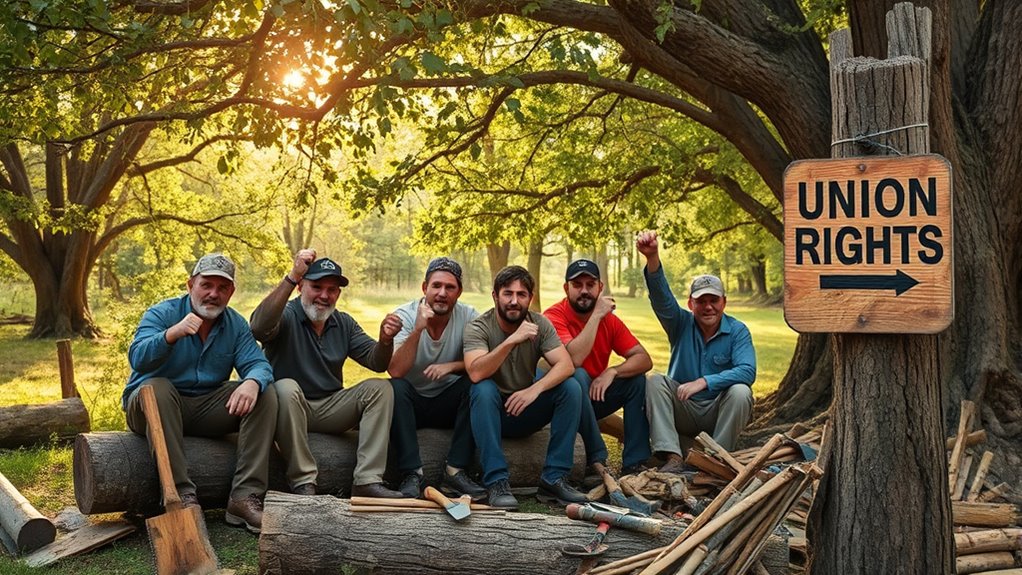
Understanding your rights to organize and access labor resources is essential for advocating for fair treatment and better working conditions. You have the right to join or form unions, which protect your interests through collective bargaining. These rights empower you to negotiate wages, hours, and safety standards effectively. Knowing your rights helps you resist unfair practices and guarantees your voice is heard.
| Your Rights | What It Means |
|---|---|
| Union Rights | Join or create unions for support |
| Access to Labor Resources | Use available resources for assistance |
| Collective Bargaining | Negotiate terms collectively |
| Protection from Retaliation | Safe from unfair treatment or punishment |
| Information Rights | Access info on labor laws and protections |
Frequently Asked Questions
Are Seasonal Firewood Workers Eligible for Unemployment Benefits?
You might wonder if seasonal firewood workers qualify for unemployment benefits. Eligibility depends on your work history and the state’s unemployment laws. If you earned enough wages during your employment period and are unemployed through no fault of your own, you could be eligible for unemployment benefits. Keep in mind that seasonal worker benefits vary by state, so check your local unemployment office to confirm your unemployment eligibility.
How Does Paid Time off Apply to Temporary Firewood Workers?
When it comes to paid time off for temporary firewood workers, it’s a case of don’t count your chickens before they hatch. Paid time off policies vary by employer and location, affecting your worker benefits. Some companies may offer accrued paid time off, while others don’t. Always review your employment agreement to understand your rights and benefits, so you’re not caught flat-footed if you need time off.
Are There Specific Age Restrictions for Working in Firewood Harvesting?
You might wonder about age restrictions for firewood harvesting. Child labor laws typically set minimum working ages, often around 14 or older, depending on your state or country. These laws aim to safeguard young workers’ safety and well-being. If you’re under the legal age, you probably can’t participate in firewood harvesting. Always check local regulations to ensure compliance, and remember that safety rules take priority for young workers.
What Language Support Is Available for Non-English Speaking Workers?
Thinking about language support is like finding a bridge when words feel like bricks. You, as a worker, can access multilingual assistance and translation services provided by employers or community organizations to overcome language barriers. These resources help guarantee clear communication about safety, rights, and job instructions. By utilizing available translation services, you can work confidently, stay informed, and avoid misunderstandings, making your work environment safer and more inclusive.
Can Seasonal Workers Receive Health Insurance Coverage Through Employment?
You might wonder if seasonal employment includes health insurance coverage. Generally, it depends on the employer and the number of hours worked. Some companies offer health insurance to seasonal workers, especially if they work full-time or for extended periods. It’s important to ask your employer about health insurance options upfront. Keep in mind that eligibility for health insurance in seasonal employment varies, so clarify this during your job application process.
Conclusion
Understanding your rights under labor laws is vital, especially since seasonal firewood workers face unique challenges. Did you know that over 20% of agricultural and seasonal workers experience work-related injuries each year? By knowing your employment classification, wage rights, and safety protections, you can better advocate for yourself and stay protected. Stand firm, stay informed, and make sure your hard work is recognized and fairly treated. You deserve safe, fair, and respectful working conditions.
